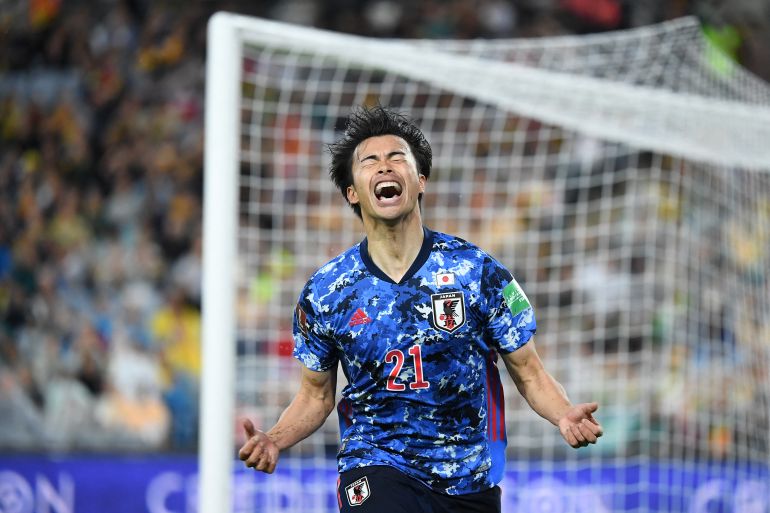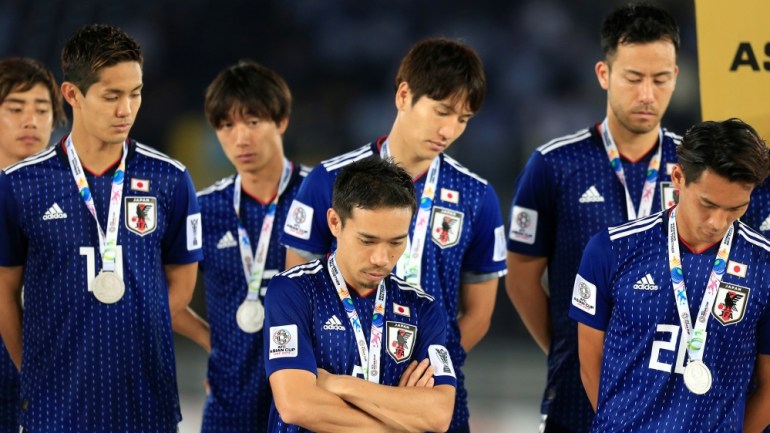Can Japan turn potential into results at World Cup 2022?
Japan may exceed expectations despite being placed in the ‘group of death’ with Germany, Spain and Costa Rica.

World Cup appearances: 6 (1998, 2002, 2006, 2010, 2014, 2018)
Titles: 0
Best Finish: Round of 16 (2018, 2010, 2002)
World Cup record: W5, D5, L11
Biggest win: 3-1 vs Denmark (2010)
Ranking: 24
Key players: Daichi Kamada
Fixtures: Germany (November 23), Costa Rica (November 27), Spain (December 2)
Things will not be easy for the Blue Samurai at the 2022 World Cup.
Keep reading
list of 4 itemsSenegal’s Mane in injury scare 11 days ahead of World Cup
The 10 football World Cup heroes
What’s happening in Qatar besides the football?
Hajime Moriyasu’s side have been placed in Group E with 2014 winners Germany, 2014 quarter-finalists Costa Rica and 2010 champions Spain.
Japan can take heart from the fact that the team tends to exceed expectations.
At the 2018 World Cup, it advanced to the round-of-16, despite being placed in a group which contained Poland, Senegal and Colombia.
A poor showing in the 2014 World Cup was preceded by an impressive 2010 tournament in South Africa, during which they advanced from the group stages before being beaten by Paraguay on penalties. At that tournament, Japan recorded wins over Denmark and Cameroon in between a 1-0 loss to eventual runners-up Netherlands.
“It’s not going to be an easy path [out of the group],” Japan Times sports writer Dan Orlowitz told Al Jazeera. “Everyone agrees that a win against Costa Rica and then at least a draw with either Germany or Spain is the most realistic way forward. Those results won’t come easy but they’re not impossible if the team plays at its best.”
Japan currently have several players playing in Europe. The squad, which, on paper, is as good as it has ever been when it comes to technical qualities.
But they have lacked leadership and calmness on the field without the presence of former players Keisuke Honda and Shinji Kagawa in attack.

This was shown in their World Cup qualification campaign as they were held to a draw at home by Vietnam. In June, they lost 3-0 to Tunisia in Osaka.
Moriyasu’s side did follow up strongly with convincing wins over South Korea and the United States but they will have to be more clinical in the World Cup if they want to advance to the knockout phase.
For Orlowitz, players such as Junya Ito, Kaoru Mitoma and Daichi Kamada will have to step up.
“What Honda and Kagawa brought to the team is star power which is missing these days. It is one of the few complicated and intertwined reasons behind the team’s recent drop in popularity. Takefusa Kubo and Takumi Minamino are the faces of the team in that sense but if we are being honest, they’ve yet to really perform when it matters,” said Orlowitz.
An attacking midfielder by trade, Kamada is the engine of the Japanese team and will arguably be their most important player in the World Cup.
He also brings a winning mentality to the squad, having helped Eintracht Frankfurt win the Europa League in May this year.
Yoichi Tominaga, a Kagoshima resident, who has been a fan of Japanese football for almost 30 years, is not too confident about his country’s chances, though. Tominaga believes that Moriyasu’s tactical decisions are flawed and that this could cost the team.
“I don’t think the team is heading in the right direction under Moriyasu,” Tominga told Al Jazeera.
“Players trust him as he is a good person but he is not a good tactician. If the players could have a tactically minded coach, they could be playing much better than they are now. As an underdog team, we could have a chance to beat great teams like Germany and Spain but we need to be organised. We will never forget the 2018 World Cup where we led Belgium 2-0 before losing 3-2.”
